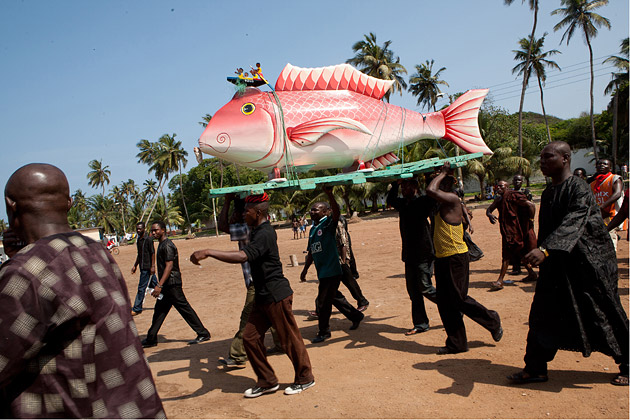VIEWER DISCRETION IS ADVISED
Funerals in Ghana are conducted in unique ways, often based on cultural and religious beliefs.
Such funerals are not just an occasion to mourn but also an opportunity to celebrate the life and pay respect to the departed soul.
These days, Ghanaian funerals are very elaborate, and it is very common for families to spend huge sums of money on funerals.
Due to the diversity of cultures in the world, different civilizations have different ways of carrying out these ceremonies since they are grounded in time-honoured norms.
Funerals in Ghana have become relevant worldwide due to the unique rituals they are associated with. Some Ghanaians like to make customized caskets for their loved ones who have passed away.
These custom-made caskets come in many shapes and sizes and are designed to reflect the predominant occupation of the deceased.
So a singer may be buried in a coffin shaped in the form of a microphone, a fisherman buried in a fish-shaped coffin, a barber will have a coffin shaped like a pair of scissors, a known drunkard will have a coffin in the shape of a beer bottle and a stool coffin for a chief, amongst others.
Certain shapes, such as the sword, may represent a leadership role in society, whether regal or priestly. So basically, some families request certain custom-made coffins to depict the kind of life the deceased lived or what the dead were well known for.
In this article, The Ghana Report took the initiative to explore the new trend.
In the video below, the deceased was an electrical engineer who reportedly used to climb electric poles to solve electrical problems. Hence, his family decided to “climb him in state” so mourners could pay their last respects.
Some families go beyond the normal. The corpse is not laid down but positioned upright, as seen in the videos below.
Regarding funerals in Ghana, the activities often commence on a Friday evening, when the deceased is brought from the mortuary, and the undertaker baths, dresses the body and sets it up for filing all through the night till about 8 am on Saturday. Wake-keeping is practised in many cultures worldwide as vigils are held on the night leading to the funeral day.
In some cultures, wake-keeping was associated with prayers offered during the vigil. However, in many countries, including Ghana, wake-keeping has slowly become a setting for social interaction.
During wake keepings in Ghana, the corpse is dressed and laid in state for public viewing, accompanied by dirges and inspirational songs all night.
Sympathizers usually comfort and soothe family members gripped by grief and courageously face the difficult moments. The practice of “wake-keeping” varies from culture to culture or beliefs, but one intriguing aspect of this practice in Ghana is that the corpses are usually dressed and given props that indicate their professions.
For instance, a deceased goalkeeper (footballer) could be dressed in his jersey and be positioned in a goalpost with a ball in hand in an open space for viewing or filing past by friends and family members. Also, a street food vendor could be dressed with a table set before the corpse with a ladle in hand and other props to indicate her business.
These practices have become common, all in the bid to pay their last respect to the deceased. Some families even go to the extent of putting their dead on spinning beds before the coffins.
Now, the questions roll in.
Is it appropriate for corpses to be exposed publicly? What effects does the exposure of corpses have on the living? How safe is this practice for undertakers? Is it necessary to position the corpse to reflect the lifetime profession of the deceased?
The General Secretary of the Mortuary Workers Association of Ghana, Mr Richard Kofi Jordan, said in an exclusive interview with The Ghana Report that exposing yourself to corpses can also expose you to a lot of diseases, such as asthma, leukaemia, and many other airborne diseases.
The board member of the newly inducted Mortuaries and Funerals Facility Agencies stated that exposing oneself to dead bodies, especially in enclosed spaces, is a health risk because most of the chemicals used in preserving dead bodies are very harmful to living things, especially humans.
Mr. Jordan further disclosed that the Ministry of Health has inaugurated a five-member committee to regulate, license undertakers, and control how funerals are conducted in the country.
He further stated that the committee comprises of members from the Environmental Protection Agency, District Assemblies, and Attorney General’s Department.
According to Mr Jordan, the committee will see to the production of environmentally protective coffins and caskets and look forward to disposing of dead bodies in an environmentally friendly manner.



